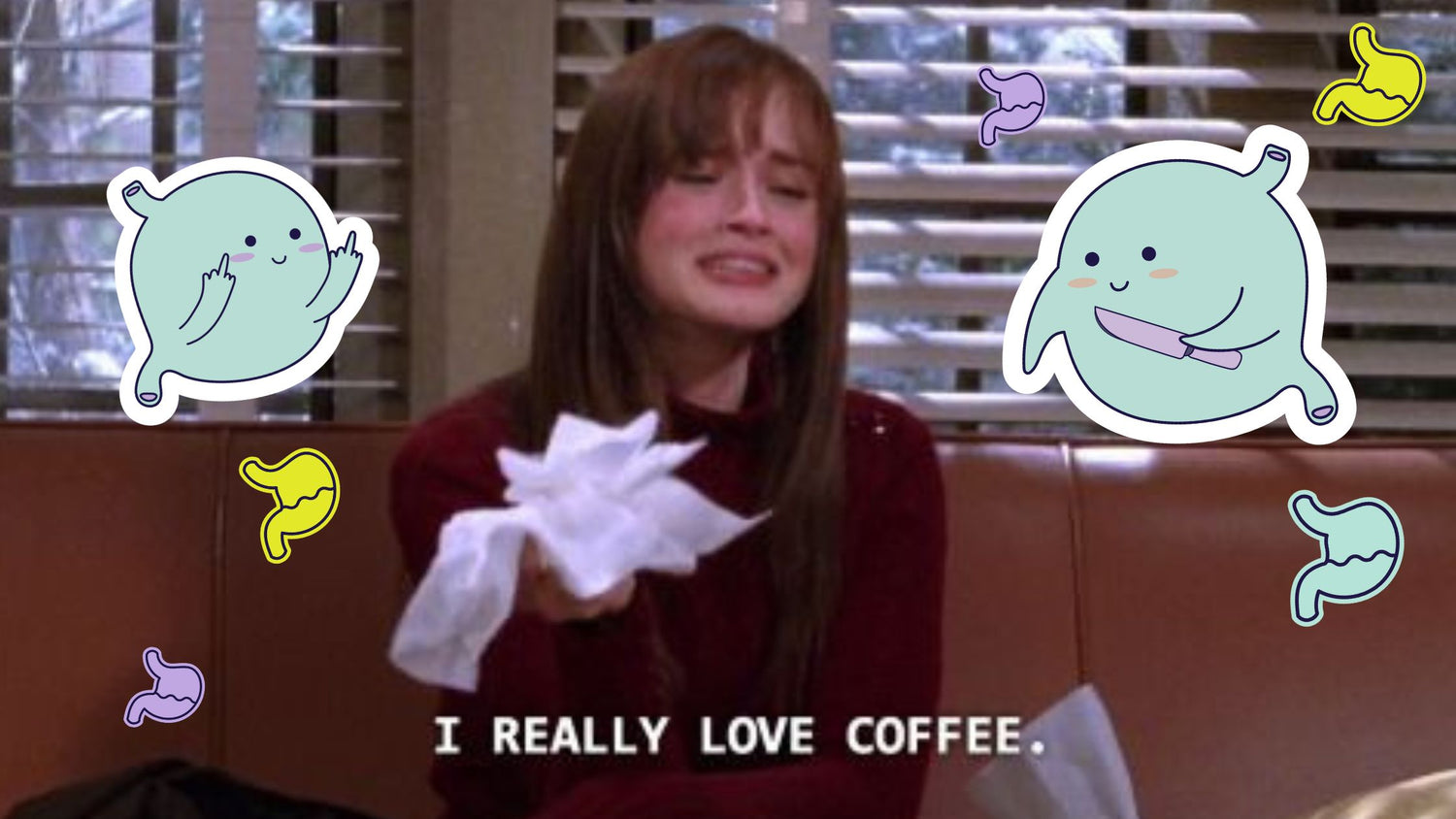Caffeine is a well-loved substance. It’s found naturally in coffee beans and tea leaves, and is also added to energy drinks and some supplements like caffeine tablets or gummies. Caffeine is a known stimulant that can increase alertness, concentration, and performance, but it can have some negative side effects on the gut in some individuals.
One of the potential side effects of consuming caffeine is bloating, a digestive issue that causes a feeling of fullness in the abdomen, abdominal distention, or digestive discomfort. In this article, we’re going to cover what caffeine is and how it can negatively impact the gut.
We will then move on to some gut-friendly alternatives to caffeine that you can use if you need a boost of energy but don’t want to consume too many caffeinated drinks and some top tips on how you can relieve caffeine-related bloating.
What is Caffeine?
Caffeine is a fast-acting stimulant that is chemically known as 1,3,7-trimethylxanthine. It is technically a drug because it can adjust your state of mind by affecting the activity of the central nervous system.
Normally, the levels of a compound called adenosine build up in the brain and bind to complementary receptors. The build-up of adenosine causes you to feel tired and lethargic.
Caffeine binds to adenosine receptors, blocking adenosine from binding them so it can’t elicit a biological response and cause you to become tired. This is why you feel less lethargic and more alert, focused, and ready for a productive day when you consume a caffeinated drink.
Caffeine also stimulates the release of adrenaline and noradrenaline, which are so-called ‘stress hormones’ that increase arousal, attention, and cognitive function.
Caffeine occurs naturally in the leaves, fruits, and seeds of various plants, including coffee beans, tea leaves, cocoa beans, and kola nuts.
Your sensitivity to caffeine depends on which variant of the Cytochrome P450 1A1 gene you have in your DNA. The variant you have either makes you a rapid or slow metaboliser of caffeine. If you’re lucky enough to be a rapid metaboliser of caffeine, you’re much less likely to experience side effects when you drink a caffeinated beverage than slow metabolisers, even if you have several a day!
On average, caffeine has a half life of four to six hours, meaning it takes this long for your body to metabolise half of the caffeine you have ingested.
How Does Caffeine Negatively Affect the Gut?
Caffeine can provide a number of positive effects, including increased alertness, concentration, and focus. It can promote better physical and mental performance, which is great if you’ve got a tough training session or a long day of difficult work meetings ahead.
However, as beneficial as coffee can be for some, it can cause negative effects in others. Even people who metabolise caffeine very quickly and very rarely have side effects when they drink coffee or tea can experience issues if they consume too much caffeine.
Some people can get jittery and anxious when they consume caffeine and may have poor sleep when they have coffee or tea later in the day. It can also cause digestive issues, including acid reflux, abdominal cramps, and bloating.
Caffeine can negatively impact the gut in a number of ways. Caffeine can disrupt gut function by:
- Acting like a laxative and stimulating the smooth muscle of the colon, causing diarrhoea and abdominal cramps
- Increasing acid production, potentially leading to Gastroesophageal Reflux Disease (GORD) and gastritis, which can cause discomfort in the chest and abdomen
- Causing dehydration, which may lead to constipation and abdominal pains when going to the toilet
- Irritating the lining of the gut and increasing inflammation, worsening pre-existing digestive conditions like irritable bowel syndrome (IBS) or stomach ulcers
- Disrupting the action of common gastrointestinal medications, such as antacids or proton pump inhibitors (PPIs)
- Being manufactured with the use of chemical pesticides and fertilisers that remain on the coffee beans when they’re sold in the supermarket and may cause gut issues when consumed
What Are Alternatives That Are Gut Friendly?
If you’re sensitive to caffeine and tend to experience a lot of gas, bloating, and digestive discomfort when you drink it, whether in coffee, tea, or energy drinks, you might be searching for some great alternatives.
Try the following strategies to avoid the negative effects of caffeine on the gut:
- Switch to decaffeinated coffee and tea bags instead of caffeinated options
- Choose organic coffee that is produced without the use of harsh chemical pesticides and fertilisers
- Avoid energy drinks that contain a lot of caffeine and switch to other types of soft drinks if you need a sugar boost
- Cut back on the amount of caffeinated coffee or tea that you drink and find an alternative type of beverage, such as still or sparkling water
- Try flavoured herbal teas instead of traditional caffeinated tea
How Can I Relieve Bloating from Caffeine?
Whether you’re sensitive to caffeine or not, you might still experience some unwanted bloating and gas when you consume it. Below, we’ve got some helpful tips to relieve caffeine-related bloating.
Add A Dose For Bloating into your daily routine
A Dose For Bloating is your answer to tackling caffeine-related bloating! It contains two billion probiotic bacteria, seven digestive enzymes, and seven plant extracts to create bloat-busting capsules that you can take each day.
Probiotic bacteria include Lactobacillus and Bifidobacterium, and they have known benefits for the human digestive system. They help with the production of vitamins B12 and K, as well as short-chain fatty acids. They feed on prebiotic fibres that are found in whole grains, fruits, and vegetables.
Taking a probiotic supplement can boost the levels of beneficial bacteria in your gut and support your digestive system to reduce unwanted symptoms like bloating, gas, cramps, and constipation.
Digestive enzymes can also aid digestion. They’re produced naturally in the digestive tract but supplementing with exogenous (out of body) enzymes can increase gut motility and reduce bloating. Taking a digestive enzyme supplement can be particularly helpful if you have a condition that causes you to produce less than normal amounts of digestive enzymes, such as Exocrine Pancreatic Insufficiency (EPI).
Plant extracts can contain prebiotic fibres that fuel the beneficial bacteria in your gut microbiome and enable them to perform their essential functions. Certain plant extracts can reduce inflammation within the gut, others can tackle oxygen free radicals to minimise oxidative stress, and others can promote bowel regularity.
Switch from caffeinated teas to herbal teas
Herbal teas don’t contain any caffeine, making them a great alternative to traditional tea or coffee, both of which do contain caffeine. You can get a wide range of herbal teas, including chamomile, mint, hibiscus, peppermint, ginger, and lemon.
Many herbal teas are known to promote better digestive health and function by relieving gas, bloating, and nausea. They can also ease anxiety, indirectly tackling digestive issues by reducing cortisol, which can divert blood away from the gastrointestinal tract and slow down digestion.
Even if you don’t want to switch every caffeinated tea to a herbal alternative, swapping just one of two cups a day could make a difference and significantly reduce your bloating.
Avoid drinking coffee on an empty stomach
If you’re prone to caffeine-related digestive issues, you’ll probably want to avoid drinking it on an empty stomach. Consuming caffeinated coffee, especially if you have it without milk, can increase stomach acidity and increase the risk of heartburn, bloating, nausea, and abdominal cramps.
It’s best to eat something before you make yourself a cup of coffee to line your stomach first. Alternatively, make sure you add a decent splash of milk into your coffee (or even a bit of cream if you prefer a thicker, creamier coffee) to reduce the acidity of the coffee and minimise digestive symptoms.
Consider adding MCT oil to your coffee
MCT stands for medium chain triglycerides. It is a type of fact that the body can easily metabolise and absorb for quick energy. Despite providing the body with immediate energy to use, MCT oil does not raise blood glucose, making it a popular choice for those on the ketogenic diet.
You can add MCT oil to your coffee to provide an energy boost and also support your digestion. Medium chain triglycerides can promotes the healthy growth of the gut lining, strengthening the intestinal barrier and reducing the chance of harmful organisms passing from the gut into the bloodstream. It can also aid the growth of probiotic bacteria in the colon to improve the composition of the gut microbiome.
Drink enough water to keep your body hydrated
Staying hydrated by drinking plenty of water throughout the day can help to reduce the negative effects of caffeine, including dehydration, fatigue, and bloating. Caffeine is a diuretic, meaning it causes you to excrete more fluid in your urine, eventually causing you to become dehydrated if you don’t replace this lost fluid quickly enough.
Dehydration is a key player in bloating and abdominal discomfort, as it can increase the risk of constipation. Keeping a filled bottle of cold water next to you throughout the day so you can take regular sips is a great lifestyle change to relieve bloating by staying hydrated. If you think you will forget to drink, set reminders on your phone to alert you every hour or so to take a few sips from your bottle.
Get your energy boost from elsewhere
If you drink caffeine for the energy boost, consider the alternatives that are available. Natural supplements, such as adaptogenic herbs like ginseng, Rhodiola, and ashwagandha, or B vitamins, are great ways to boost your energy without resorting to a cup of caffeinated coffee.
Exposure to bright light can also be an effective way to boost your energy without caffeine. It can help regulate your circadian rhythm and enable you to feel more alert during the lighter hours of the day.
Consuming healthy snacks is another great way to increase your energy levels without reaching for coffee or tea. Consider making protein oats for breakfast, creating your own trail mix, or snacking on fruit and peanut butter.
Eat more potassium in your diet
Assuming you don’t have a chronic health condition that can put you at risk of hyperkalaemia (high blood potassium), such as chronic kidney disease (CKD) or renal failure, you may benefit from consuming more potassium in your diet.
Potassium is abundant in avocado, banana, potato, and dried fruit. Potassium can act as a natural remedy for bloating by reducing water loss from the kidneys and gut. This keeps the body hydrated and prevents constipation and bloating.
Reduce your stress
Stress is one of the most common causes of bloating. When you’re stressed, whether physically (such as from overtraining), mentally (due to work, financial worries, or relationship issues), or both, your brain causes your adrenal glands to produce cortisol and adrenaline.
These ‘stress hormones’ divert blood away from the gut to the skeletal muscles to fuel them in case you need to fight or run away from the perceived danger (aka the stressor). A reduction in blood flow to the gastrointestinal tract slows down your digestion and increases the risk of constipation, gas, and bloating.
Cutting down your stress could help to relieve bloating, even if you continue to consume a lot of caffeine. You might think that it’s your many cups of coffee causing your bloating, but it might, in fact, be your stressful lifestyle that is fuelling your digestive issues.
Of course, cutting back on the stressors in your life can be easier said than done. However, making several small adjustments in your life can add up to make a significant difference to the way you feel and act each day.
Try cutting back on your gym workouts, outsourcing some of your work tasks (if possible), and fostering healthy relationships with those around you to relieve some of your stress. You might find that making small, positive changes to your lifestyle to minimise your stress could be all you need to do to tackle your digestive issues.









